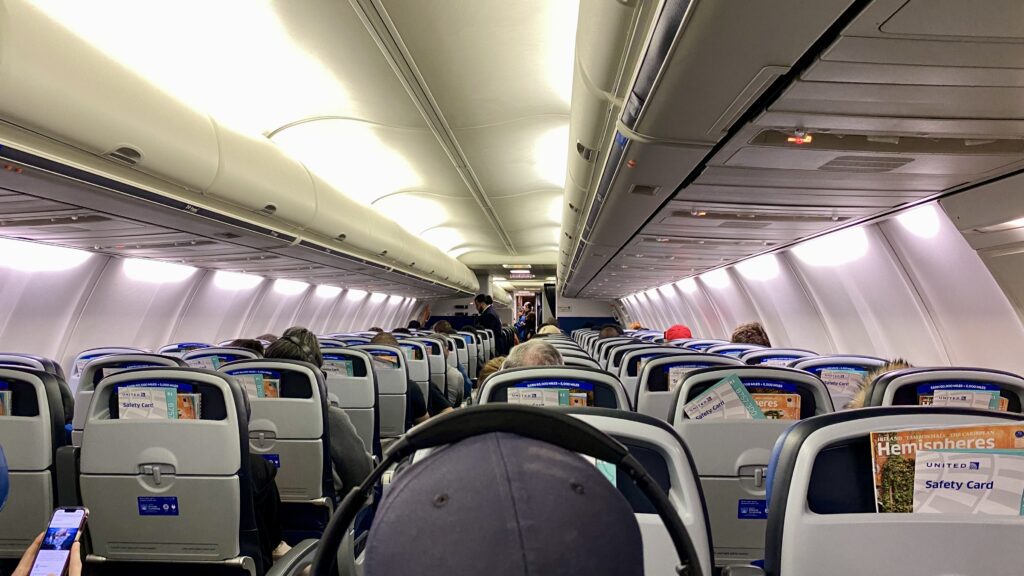If you’re flying anytime after May 1, congratulations: the airlines have decided you weigh less. No, you didn’t suddenly drop 10 pounds, and no one snuck a scale under the jet bridge. It’s just that airlines switch to “summer weights,” where they assume passengers shed their winter coats, boots, scarves… and maybe even a few pounds of, ahhhh,” personal baggage.”
This quirky but critical change comes straight from the FAA’s weight and balance rules. It’s been happening for years, but now it feels more noticeable as flights are running at max capacity.
We first encountered the real-world impact of weight limits a few years ago when flying United on a 757-200. Two days before departure, United notified us our seats had been changed. When we boarded, we found the middle seat we originally booked had been blocked.
At the time, I wondered if it was a mechanical issue. After all, United knew about it two days ahead—so why not fix it?
Enter YMMV reader Jason S., who correctly solved the mystery: it was about weight restrictions.
The seat was not broken… it is in-op through the end of April. Airlines (except for small aircraft under a certain weight) use a standard average weight per passenger in their weight and balance calculations, in lieu of weighing every single passenger and their carry-ons.
The FAA, to account for the changing average American physique, raised the weights. There are summer and winter weights (Nov 1 and Apr 30 are the swap-over dates).
The Weighty Truth About Airline Passenger Math
Airlines don’t weigh every individual passenger (thankfully), but they do have to calculate weight and balance to keep things safe. Most use Standard Average Passenger Weights, based on CDC data. These estimates include the person and their carry-ons.
Airlines use a slightly higher figure called winter weight to account for winter jackets, boots, scarves, and whatever else we pile on from November 1 to April 30. When May 1 rolls around, they magically assume we’ve shed the coats, the extra layers, and (let’s be real) maybe even a few pounds from our holiday overindulgence.
If only my scale at home followed FAA guidelines.
How Much Do Airlines Think We Weigh?
The most recent CDC update adjusted the numbers:
-
Women: 179 lbs in summer, 184 lbs in winter
-
Men: 200 lbs in summer, 205 lbs in winter
Yes, the clothes you wear could tip an entire airplane’s balance.
On smaller or fully booked planes, like United’s now-retired policy of blocking seats on certain Boeing 757-200s, airlines had to leave seats empty during the winter to stay within the FAA weight limits. That specific example is no longer needed after United and Boeing addressed the issue (source), but the broader seasonal weight dance remains very real across the industry.
It’s Not Just About You
The FAA’s guidelines even allow airlines to apply for exceptions if their routes have little seasonal variation. For example, flights from Miami to the Caribbean don’t have the same winter coat dilemma as flights from Chicago to Denver.
But for most routes, airlines dutifully switch over on May 1 to assume you’ve swapped your puffer jacket for shorts and Crocs. It’s a nice thought.
So, Why Are Seats Blocked?
If you notice a mysteriously empty seat, it might not be broken. The plane could be riding close to weight limits, and that one passenger’s worth of Croc-adjusted weight made all the difference.
Airlines also go to impressive (and sometimes ridiculous) lengths to shave off ounces from cabins, since less weight equals less fuel burn and the ability to sell more tickets. We covered some of those moves here.
Now You Know the Rest of the Story
So, as airlines switch back to summer weights, just remember: your wardrobe has officially been factored into flight safety. Who knew your clothing styles were a critical part of aviation math?
Want to comment on this post? Great! Read this first to help ensure it gets approved.
Want to sponsor a post, write something for Your Mileage May Vary, or put ads on our site? Click here for more info.
Like this post? Please share it! We have plenty more just like it and would love it if you decided to hang around and sign up to get emailed notifications of when we post.
Whether you’ve read our articles before or this is the first time you’re stopping by, we’re really glad you’re here and hope you come back to visit again!
This post first appeared on Your Mileage May Vary
Join our mailing list to receive the latest news and updates from our team.

